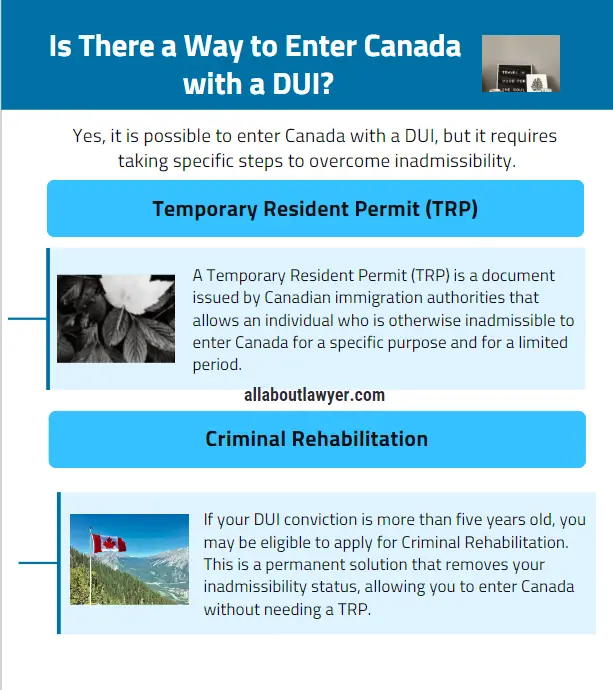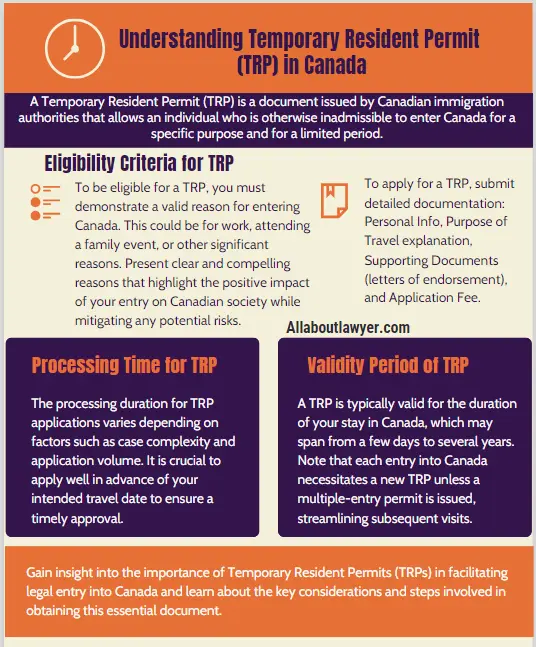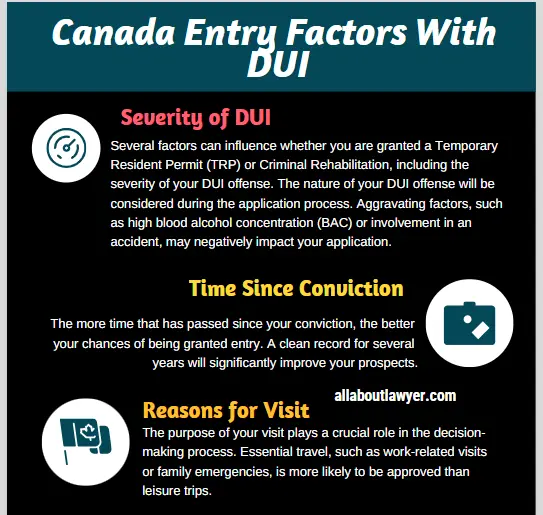Can You Go to Canada with a DUI?
Traveling to Canada with a DUI conviction can be challenging due to strict Canadian immigration laws. A DUI is considered a serious offense in Canada, and individuals with such convictions may be deemed criminally inadmissible, which could prevent them from entering the country. This guide will provide you with a detailed overview of the process, the challenges, and the options available for those have a question in mind that Can You Go to Canada with a DUI.
Table of Contents
Understanding Canada’s DUI Entry Rules
Canada takes impaired driving offenses seriously, and a DUI is classified as an indictable offense under Canadian law, similar to a felony in the United States. This means that if you have a DUI conviction on your record, you could be barred from entering Canada. The good news is that there are ways to overcome this inadmissibility, but the process can be complex.
1. What Makes a DUI Conviction a Barrier to Entry?
A DUI conviction is a significant legal matter in Canada. Canadian law views a DUI as a serious offense, and as such, it can result incriminal inadmissibility. This means that anyone with a DUI on their record may be prohibited from entering the country, whether they are visiting for business, leisure, or other purposes.
Time Frames and Eligibility
The passage of time can significantly affect your ability to enter Canada with a DUI. Here are some key time-related considerations:
Recent Convictions: If your DUI is very recent, you’re almost certain to be denied entry.
5-Year Rule: After five years from the completion of your sentence (including probation and payment of fines), you may become eligible for what’s known as “deemed rehabilitation.
10-Year Eligibility: With a single DUI conviction and no other offenses, you may be automatically considered rehabilitated after ten years, provided you’ve completed all sentencing requirements.
It’s crucial to understand that these timeframes are general guidelines. Each case is evaluated individually, and factors such as multiple offenses or aggravating circumstances can extend these periods.
Read also: Can You Get a CDL with a DUI?
2. Is There a Way to Enter Canada with a DUI?
Yes, it is possible to enter Canada with a DUI, but it requires taking specific steps to overcome inadmissibility. The most common methods include applying for a Temporary Resident Permit (TRP) or seeking Criminal Rehabilitation.

Temporary Resident Permit (TRP)
A Temporary Resident Permit (TRP) is a document issued by Canadian immigration authorities that allows an individual who is otherwise inadmissible to enter Canada for a specific purpose and for a limited period. Here’s how the TRP process works:
1. Eligibility for TRP
To be eligible for a TRP, you must demonstrate a valid reason for entering Canada. This could be for work, attending a family event, or other significant reasons. The key factor is to prove that the benefits of your entry outweigh any potential risks to Canadian society.
2. Applying for a TRP
The application process for a TRP involves submitting detailed documentation, including:
-Personal Information: Full details about your identity and criminal record.
-Reason for Travel: A clear explanation of why you need to enter Canada.
-Supporting Documents: Letters from employers, family, or other relevant parties to support your case.
-Application Fee: A non-refundable fee must be paid when submitting your application.
Read also: Can You Lose Financial Aid for a DUI?
Also read: Where Do DUI Offenders Go to Jail?
3. How Long Does it Take to Get a TRP?
Processing times for TRP applications can vary, depending on several factors, such as the complexity of your case and the volume of applications. It’s essential to apply well in advance of your planned travel date.
4. How Long is a TRP Valid?
A TRP is typically valid for the duration of your stay in Canada, which can range from a few days to a few years. However, each entry requires a new TRP unless a multiple-entry permit is granted.

Criminal Rehabilitation
If your DUI conviction is more than five years old, you may be eligible to apply for Criminal Rehabilitation. This is a permanent solution that removes your inadmissibility status, allowing you to enter Canada without needing a TRP.
1. Eligibility for Criminal Rehabilitation
To be eligible for Criminal Rehabilitation, at least five years must have passed since the completion of your sentence, including any probation or fines. Additionally, you must demonstrate that you have been rehabilitated and are unlikely to re-offend.
2. The Application Process
The Criminal Rehabilitation application process involves submitting detailed documents, similar to the TRP application, including:
-Proof of Rehabilitation: Evidence that you have changed your behavior since the conviction.
-Supporting Documents: Court documents, police records, and any relevant certificates.
-Application Fee: The fee for Criminal Rehabilitation is higher than that for a TRP but is a one-time payment.
3. Processing Time
The processing time for a Criminal Rehabilitation application can take over a year, so it’s essential to plan well in advance if you intend to travel to Canada.
Factors that Influence Your Chances of Entry To Canada If You Have DUI
Several factors can influence whether you are granted a TRP or Criminal Rehabilitation, including:
1. Severity of the DUI Offense
The nature of your DUI offense will be considered during the application process. Aggravating factors, such as high blood alcohol concentration (BAC) or involvement in an accident, may negatively impact your application.
2. Time Since the Conviction
The more time that has passed since your conviction, the better your chances of being granted entry. A clean record for several years will significantly improve your prospects.
3. Your Reasons for Visiting Canada
The purpose of your visit plays a crucial role in the decision-making process. Essential travel, such as work-related visits or family emergencies, is more likely to be approved than leisure trips.

Traveling to Canada Without a TRP or Criminal Rehabilitation
In some cases, individuals with a DUI may enter Canada without applying for a TRP or Criminal Rehabilitation if the conviction is minor and considered a summary offense under Canadian law. However, this is rare, and it’s advisable to consult with a Canadian immigration lawyer to understand your options.
The Role of a Canadian Immigration Lawyer
Navigating the complexities of entering Canada with a DUI conviction can be daunting. A Canadian immigration lawyer can provide valuable assistance by:
-Assessing Your Eligibility: Determining whether you qualify for a TRP or Criminal Rehabilitation.
-Preparing Your Application: Ensuring all required documents are complete and accurately reflect your situation.
-Representing You: Advocating on your behalf with Canadian immigration authorities.
Hiring a lawyer can increase your chances of successfully entering Canada and help you avoid potential pitfalls during the application process.
Conclusion
Traveling to Canada with a DUI on your record requires careful planning and an understanding of Canadian immigration laws. While a DUI can present significant challenges, options are available to overcome these barriers, such as applying for a Temporary Resident Permit or Criminal Rehabilitation. By taking the appropriate steps and seeking legal advice, you can increase your chances of successfully entering Canada and avoid complications at the border.
Also Read: How Many Years in Jail for Drunk Driving and Killing Someone?
FAQs
1. Can I Enter Canada with a DUI if I Am a U.S. Citizen?
Yes, but you may need a Temporary Resident Permit or Criminal Rehabilitation, depending on the details of your DUI conviction and the time that has passed since the offense.
2. How Long Do I Have to Wait After a DUI to Apply for Criminal Rehabilitation?
You must wait at least five years after completing your sentence, including probation and fines, before applying for Criminal Rehabilitation.
3. What Happens if I Try to Enter Canada Without a TRP or Criminal Rehabilitation?
If you attempt to enter Canada without addressing your DUI conviction, you risk being denied entry at the border and potentially facing a permanent ban.
4. Can I Apply for a TRP at the Canadian Border?
It’s possible to apply for a TRP at the border, but it’s highly recommended to apply in advance. Applying at the border carries a higher risk of refusal.
5. Does a DUI Affect My Ability to Get a Canadian Work Visa?
Yes, a DUI can affect your eligibility for a Canadian work visa, as it may lead to criminal inadmissibility. You may need to resolve this issue before applying for a visa.
About the Author

Sarah Klein, JD, is a former criminal defense attorney with hands-on experience in cases involving DUIs, petty theft, assault, and false accusations. Through All About Lawyer, she now helps readers understand their legal rights, the criminal justice process, and how to protect themselves when facing charges.
Read more about Sarah
